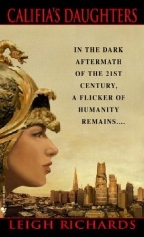Califia's Daughters
Bantam Spectra
US Mass Market Paperback
ISBN: 0-553-58667-X
Publication Date: 08-03-2004
Pages: 320; Price: $6.99
Date Reviewed: 18th August 2004
Reviewed by: Serena Trowbridge © 2004
|

|
|
REFERENCES
|
COLUMNS
|
|
Science
Fiction, General Fiction
|
07-18-03
|
Imagine a world you might have read about, historical, perhaps in
a far away land, where women are weak and constantly under threat,
sheltered and unable to fight or even travel. Imagine a world
entirely run by men, where women have little or no say in what goes
on, while the men fight wars, build cities and develop their own
version of civilization. Not so difficult, is it, because in many
instances this is how the world has been. But now, invert that world,
and think of the men being the cloistered species, having little
influence on world events, and being under threat from disease or
attack and thus constantly protected by the women. This world is the
world of Califia's Daughters, where war and disease in the
twenty-first century have left men an endangered species, and the few
remaining are valued for procreation rather than for their strength.
Indeed, in the city the men have become painted, gaudily dressed
objects not unlike eighteenth century courtesans.
There are still women who remember what the world was like before,
and a few remnants of civilization as we know it remain - one or two
computers, for example, and a few cars, but on the whole the world is
primitive, and run by strong women, who live in settlements with a
few prized men who have survived. The lands around them are full of
unknown dangers and the tribes of women live in fear of what might
attack them, and of rumors of warring factions in other tribes. One
such group of women, in a valley tucked away from the excesses of a
world gone mad, are visited by strangers, who explain that they are
hoping to settle near the valley, and give them a man and a boy as a
gift. This puzzles the central character, Dian, who sets off on a
lengthy quest to discover the truth behind these strangers.
This novel has the characteristics of so many futuristic novels: a
world where there are elements that we recognize as our own, but,
post-apocalyptic, transmuted into something quite different. A
threat, and strangers, lead to a dangerous journey - the elements of
this are not unusual. What is unusual, however, is that this is
feminist fiction, written to highlight the strengths of women and
also to appeal to a woman reader. There's even a small element of a
love story in there, although of course there is no norm for
relationships in this upside down reality. This world of women is
portrayed very convincingly, with a balance between a home life, with
children and relationships, and the strong warrior women who
literally seem to have the weight of the world on their shoulders.
Gender is both vital and also unimportant - if women do everything
then their gender becomes irrelevant, which is an ideal for a
post-modern world. In this respect it is quite unlike anything I have
read before, and it's well worth a read for that alone. The front
cover states "In the dark aftermath of the 21st century, a flicker of
humanity remains", which seems to me to be misleading, since there is
a lot of humanity left in the inhabitants of this novel, albeit
slightly wary and besieged humanity.
Califia was an Amazon queen, "beauteous of face, powerful of arm,
noble of heart", who was the leader of a race of women who lived
without men, apart from for breeding purposes, and each chapter is
headed with (somewhat cryptic) quotations from the Sergas de
Esplandian, or The Labors of the Very Brave Knights Esplandian, which
tells of the sixteenth century discovery of the Amazon race and
Califia herself. The difference, though, is that the Amazons were
actually hostile towards men and chose to live without them, whereas
in Califia's Daughters these women had no choice. Nevertheless, they
are worthy inheritors of her name. However, perhaps I became too
caught up in the gender politics, I found the plot a little weak and
lacking in direction, though the fast-paced ending of Dian's journey
in some ways makes up for this. Either way, it's well worth a read
for the interesting examination of the world as it might be.
